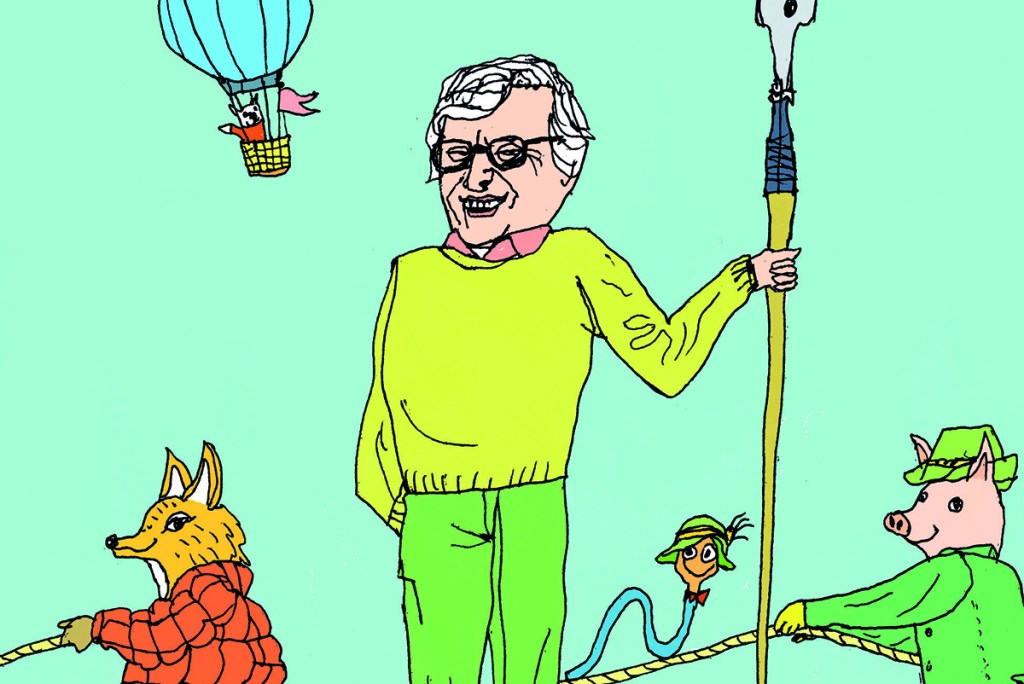If you were lucky enough to know Richard Scarry, you might get a postcard from one of the world’s most successful and celebrated children’s book authors. If you were lucky enough to be Scarry’s friend, you might get a letter from Lowly Worm. If you were lucky enough to be a close friend and also a storyteller, you might get advice from the master storyteller himself. I was very lucky to be all three.
I met Dick Scarry in 1959, when Dick bought a sailboat from my father in Westport, Connecticut. The two men had become friends based on a love of all things nautical. My father was an artist-illustrator and writer before he gave up the Madison Avenue rat race and opened a yacht brokerage and ship’s chandlery in Westport. Dick, who lived near the beach, would come to the Boat Locker to chat with my father, eventually buying a 19-foot sloop from him. As Dick’s wife Patsy and their young son Huck didn’t know how to sail, my father suggested Dick call me. I was spending my sixteenth summer teaching sailing at the Cedar Point Yacht Club. It was the beginning of a long, lovely and lasting friendship.
I met Dick and Patsy again in June, 1969, when I was visiting my parents in Weston, Connecticut. I had moved to Lausanne, Switzerland in 1967 with my seven-year-old son, Keith. Dick had often asked about me on his visits to the Boat Locker. When he discovered that I was living in Switzerland, he called me and invited me for some iced tea. The Scarrys were moving to Switzerland that September and wanted to pick my brains about where to live in Lausanne and schools for Huck. We ended up being neighbors, hiking and skiing and falling in love with Switzerland together. I ended up falling in love with Richard Corner, a man they thought I should meet. Huck walked me down the aisle. Our three children ended up with fantastic, fairy godparents.
In 1972, I became the first Swiss correspondent for the International Herald Tribune and Associated Press. Dick often passed me ideas for Swiss stories. I owe Dick and Patsy for seeing ‘something’ in my stories, which led to a nearly 50-year career.
Even after my family and I moved to Brussels in 1984, Dick couldn’t resist commenting on or mentioning a possible story. One was particularly amusing and typically Dick. I had written about the WHO in Geneva coping with bilharziasis, a devastating disease caused by a small snail found in Africa’s rivers. Dick got Lowly Worm involved:
‘Dear Bilharziasis Mary,
You know how cousins are — one of the little buggers ate my green hat — and one ate my green pants. I am sending this off to you in haste as they are trying to eat this letter.
Lowly Worm, aka Schistomasis John’
Scarry attributed Lowly’s popularity to being a ‘mad character’. The genial worm in the Tyrolean hat turned up everywhere and ‘can do anything’, he told me. Dick’s fan mail was from young and old, and Lowly was the most often mentioned. When the price of gold took off in the early Seventies, Dick started to hide ‘goldbug’ in his books. He was fascinated by Swiss banks and bankers and suggested a few stories. He told me many times that he didn’t want people to think he moved to Switzerland for tax reasons. When I wrote ‘Scarry is laughing all the way to the bank’ in a rough draft that I gave him, he asked me to please take it out. I did. I valued his friendship more than a trite cliché. It was a good lesson for me as a writer.
Dick was very generous with his time, granting me many interviews as his initial success with The Best Word Book Ever (1963) became spectacular. He enjoyed his success and was proud of his books and the perks that being a best-selling author afforded him. Dick’s British publisher, Foyle’s, gave the Scarrys membership in the tony London nightclub Annabel’s. I named our first daughter Annabelle, after my Swedish grandmother Anna — and the nightclub, at Patsy’s suggestion. In the Tribune, I wrote: ‘Scarry laughs especially when he thinks of his success abroad. He can’t get over how well his books and products do in Japan, where he is called Scarrysan.’ ‘I suppose if you get a million Japanese interested in something there’s no stopping them,’ he told me.
Dick loved a friendly contest with the woke and PC crowd of yore. He sloughed off criticism from feminists who objected, even back then, to putting aprons on female bunnies. He reacted by putting lady traffic cops and garbage women in his Cars and Trucks and Things That Go (1951), telling me, ‘I’m opposed to lady traffic cops and garbage women, so I guess I am a male chauvinist pig.’ Dick Scarry loved pigs, and Patsy told me that Dick was really Pa Pig, she was Mommy Bunny and Huck was Huckle the cat.
Denounced for his action situations being full of violence, Dick told me:
‘No one gets hurt in my books. If kids think dishes breaking and cars crashing is funny, then it’s funny. Kids laugh at my books for the same reasons they laugh at the circus. Even my villains like Bananas Gorilla are harmless. I wouldn’t draw pictures of real people falling off a bus or train. It’s too frightening. But I have Ding the Dog, who is a nice fellow but a very bad driver, crash into a fire hydrant. I’m creating real situations that children accept with amusement. Not horror.’
Scarry began writing children’s books by chance. After World War Two, when he deployed his talent for drawing in the Army, the Boston-bred illustrator settled in New York, working for magazines. In 1947, his agent suggested he illustrate a children’s book that Patsy was writing. Patsy was a successful children’s book author as well as a writer for television shows. They married in 1948.
In 1963 Scarry had the idea of doing a book for children along the lines of a Duden, the precisely illustrated German encyclopedia. It was the genesis for The Best Word Book Ever (1963) and many of his succeeding books, The Storybook Dictionary, Busy, Busy World, The ABC Word Book, The Great Big Air Book and The Best Counting Book. Children, he believed, loved detail as much as he did. ‘If you mix detail and the ridiculous with a message, children will learn something while they are laughing,’ he insisted.
Dick didn’t know what his message was but believed in entertaining children and teaching them at the same time: ‘If that happens, you can also get them to love books.’ Nothing pleased him more than to see a well-worn copy of one of his books held together with Scotch Tape. We were the lucky recipients of many of Dick’s books, all lovingly dedicated with little cartoons. I always bought another copy of each book for the children to read and wear out.
As I write this, I have at hand a copy of The Supermarket Mystery featuring Sam and Dudley, the clueless detectives, given by Dick to Keith in 1970. Keith’s two sisters, Annabelle and Lucy, gave it such a workout that its spine is made of masking tape. All three children loved the goofy sleuths and often recognized streets in Lausanne in the books. In The Great Pie Mystery, Dick even used a railroad tunnel we passed under to get to our home in the vineyards above Lutry.
Dick’s dream of owning the Swiss chalet of a woodcarver in Gstaad came true in 1972. The charming chalet’s exterior was sculpted with heads of gnomes and chamois, and the ceilings were inlaid wood. The Scarrys kept their apartment in Lausanne as a pied à terre and spent summers in Saint-Jean-Cap-Ferrat and Nantucket. We had a house in Chatham, Massachusetts and a few times visited Dick and Patsy after an often rough boat crossing. Dick would illustrate charming postcards to thank us for the visit. When the Scarrys visited us, they came by chartered airplane. We’d pick them up at Chatham’s tiny airport and return them at the end of a fabulous day of boating and laughing. Dick always asked the pilot to buzz our house and dip his wings. The kids would wave their Lowly Worm and Pig Will and Pig Won’t dolls.
Dick said he was never at a loss for ideas, particularly on the many African safaris the Scarrys took. He always had a sketch pad in his pocket. We traded tips on jaunts into game parks as Richard often had business in sub-Saharan Africa. Patsy told me about a particular trip to Addis Ababa. They were returning from Kenya to Geneva via Ethiopia, because Dick wanted to see the lions in Haile Selassie’s zoo.
Unfortunately, Dick caught malaria in Kenya. Patsy frantically tried to get a doctor to come to their hotel. When she saw two little girls reading Dick’s books by the pool, she went over to them and told them that Richard Scarry was staying at the hotel and was very sick. The girls took off, returning with their mother. She told Patsy that her husband was with Doctors Without Borders and that she would call him to return to Addis Ababa. The doctor arrived within hours, treated Dick and then arranged for a DWB airplane to take them back, Dick on a stretcher and hooked up to quinine, to Geneva. Patsy believed that Dick’s books had saved his life.
There are more than 300 published Scarry books. Dick died in Switzerland in April 2019. I still keep in touch with Huck, a gifted writer and artist, who runs the Scarry empire. He divides his time between Vienna and Gstaad. Our grandchildren enjoy Dick’s books as much as their parents did. Our five-year-old grandson sleeps in Scarry pajamas, covered in vehicles from Cars and Trucks and Things That Go. I loved reading last summer, in The Spectator, an article by Boris Johnson’s brother and sister about the challenges facing kids now: growing up without a clear idea of what they could become as adults, the rubbish that is being taught in universities.
The Johnsons mentioned how prescient Dick had been in What Do People Do All Day. It illustrates how there are still real and necessary jobs, none of them lowly: truck drivers, firemen, bakers that need skills, real parents and real teachers. Dick would have loved the article. He would probably have written a letter, or at least a postcard, to the article’s authors — and you could bet that he would have illustrated it with one of his delightful Scarry characters.
This article was originally published in The Spectator’s September 2021 World edition.

























